

Social Media and Filter Bubbles. False Information v Fake News Experts now recommend avoiding the term ‘fake news’, or at least limit its use, as the term ‘fake news’ is closely associated with politics, and this association can unhelpfully narrow the focus of the issue. The term ‘false information’ is preferable as it can refer to a diverse range of disinformation covering topics such as health, environmental and economics across all platforms and genres, while ‘fake news’ is more narrowly understood as political news stories.
What is False Information? Lots of things you read online especially in your social media feeds may appear to be true, often is not. False information is news, stories or hoaxes created to deliberately misinform or deceive readers. According to Martina Chapman (Media Literacy Expert), there are three elements to fake news; ‘Mistrust, misinformation and manipulation’. The Rise of False Information False information is not new, however it has become a hot topic since 2017. Types of False Information. Be social media smart: Is seeing believing? - BBC Bitesize. Videos & Infographics. What is referencing?
Copyright & Licenses. Ethical Participation in the Digital Environment. Ethical participation in the digital environment The online world provides seemingly limitless access to information and media.

Ethical participation requires knowledge of one’s rights and responsibilities as a digital citizen. Understanding plagiarism, copyright, and the use and application of Creative Commons licensed material is essential in the digital learning environment. Educators have a responsibility to be model digital citizens who participate ethically in the digital environment. Teaching Students to Legally Use Images Online. Copyright the Card Game – Australian Edition. Copyright The Card Game – Australian Edition is an adaptation of Copyright The Card Game v3.0 by Chris Morrison and Jane Secker.
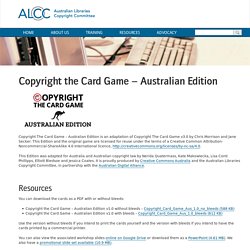
This Edition and the original game are licensed for reuse under the terms of a Creative Common Attribution-Noncommercial-ShareAlike 4.0 International licence, This Edition was adapted for Australia and Australian copyright law by Nerida Quatermass, Kate Makowiecka, Lisa Conti Phillipps, Elliott Bledsoe and Jessica Coates. It is proudly produced by Creative Commons Australia and the Australian Libraries Copyright Committee, in partnership with the Australian Digital Alliance. Resources You can download the cards as a PDF with or without bleeds: Copyright the Card Game – Australian Edition v1.0 without bleeds – Copyright_Card_Game_Aus_1.0_no_bleeds (588 KB) Copyright the Card Game – Australian Edition v1.0 with bleeds – Copyright_Card_Game_Aus_1.0_bleeds (612 KB) Creating the Australian Edition The colours.
Access the Applied Digital Skills Curriculum – Google Applied Digital Skills. School Library Journal. Openness, sharing, and choosing a CC license. The prolific Alan Levine wrote recently about licenses, and how really they’re not the be-all and end-all of sharing openly: If we just focus on licenses and picking through the morsels of what it does and does not do, IMHO we lose sight of the bigger things about sharing our work and acknowledging the work of others as a form of gratitude, not compliance with rules.[…]Share for gratitude, not for rules and license terms.
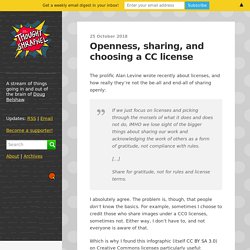
I absolutely agree. The problem is, though, that people don’t know the basics. For example, sometimes I choose to credit those who share images under a CC0 licenses, sometimes not. Either way, I don’t have to, and not everyone is aware of that. Which is why I found this infographic (itself CC BY SA 3.0) on Creative Commons licenses particularly useful: Office of the eSafety Commissioner. Michael Carr-Gregg: managing student wellbeing and cybersafety. The Australian eSafety Commissioner’s 3 core principles The Australian eSafety Commissioner, Julie Inman Grant, outlines 3 core principles that responsible digital citizens should practise: Engage positivelyKnow your online worldChoose consciously Below we have outlined how Michael suggests students can implement these principles to become responsible digital citizens. 1.
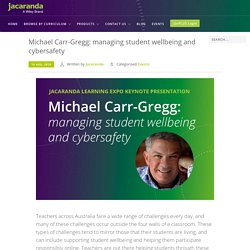
MEDIA LITERACY WEEK - Education. Fake News - ABC Education. Can you tell fact from fiction in the news? Most students can't. Have you clicked through to this article from your news feed?
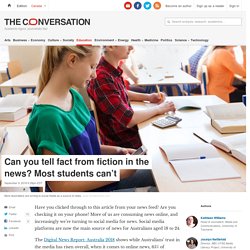
Are you checking it on your phone? More of us are consuming news online, and increasingly we’re turning to social media for news. Social media platforms are now the main source of news for Australians aged 18 to 24. The Digital News Report: Australia 2018 shows while Australians’ trust in the media has risen overall, when it comes to online news, 65% of Australians are still concerned about what’s real and what isn’t. Less than one-quarter of those surveyed said they trusted social media as a source of news.
Despite the issues with trust, news media is a critical part of keeping up to date and informed for most Australians – particularly young people. 10 Internet Safety Tips for Teachers And Schools. There’s a growing emphasis placed on teaching students about digital citizenship.
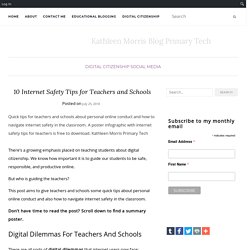
We know how important it is to guide our students to be safe, responsible, and productive online. But who is guiding the teachers? This post aims to give teachers and schools some quick tips about personal online conduct and also how to navigate internet safety in the classroom. Don’t have time to read the post? Office of the eSafety Commissioner. SWGfL Digital Literacy - Home. Teaching Digital Citizenship with Picture Story Books. *This post was first published on Matt Miller’s Ditch That Textbook blog. Living in the 21st Century where many students have access to 1:1 devices at school and even more devices at home, Digital Citizenship is a highly important topic our students need to understand. Curriculum’s world wide mandate the need to teach students about Digital Citizenship, yet many teachers find it quite daunting to teach their students these vital skills to ensure their safety in online spaces.
Students need to be aware of the risks and dangers that exist online from an early age. My love for teaching through picture story books has allowed me to find a range of very supportive books to help teachers teach students about the key concepts of Digital Citizenship. Here is a list of some of my favourites; Apps in Education: Tablet Use in Schools: Ergonomics, Posture and Screentime Recommendations. As we have been discussing lately, rolling out a BYOD Program can generate a lot of interesting conversations with students, parents and teachers.
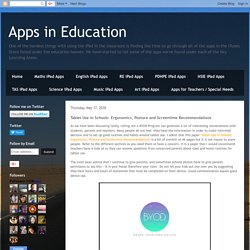
Many people do not feel they have the information in order to make informed decision and to set up good routines and habits around tablet use. I admit that this paper 'Tablet Use in Schools: Ergonomics, Posture and Screentime Recommendations' is a bit of overkill at 46 pages but it is not meant to scare people. Refer to the different sections as you need them or have a concern.
It is a paper that I would recommend teachers have a look at so they can answer questions from concerned parents about class and home routines for tablet use. Why you should talk to your children about Cambridge Analytica. Former Cambridge Analytica employee Christopher Wylie blew the whistle last month.

He revealed the data analytics agency harvested Facebook data from more than 50 million individual profiles, matched these with electoral rolls, and then devised an algorithm that can use this data to predict and influence voting behaviours. It seems it’s a powerful political tool. It reportedly played a role in swaying the Brexit vote towards a “leave” outcome in the UK and sweeping Donald Trump into power in the US. But what are the implications for our kids? 7 Reasons Why Digital Literacy is Important for Teachers - Blog. Is It All Your Own Work? Navigating copyright. Is It All Your Own Work?
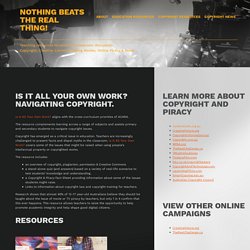
Navigating copyright. Is It All Your Own Work? Aligns with the cross-curriculum priorities of ACARA. The resource complements learning across a range of subjects and assists primary and secondary students to navigate copyright issues. Copyright has emerged as a critical issue in education. The resource includes. Clarifying Copyright - For Teachers. A guide for teachers With digital disruption changing the way we all access and disseminate information, recent changes to the legal framework for copyright with more to come, and the importance of academic integrity in the spotlight, teachers need to be tech-savvy and informed on the subject of copyright.

Research on Australians aged 12-17 indicates that: 31% pirate content onlinent 27% pirate content at school 76% have never learnt about piracy at school. 21CLHK 18 Integrating Digital Citizenship 0BAcross All Subjects and Grade Levels Matt Harris Ed.D. Why children should be taught to build a positive online presence. Rather than just teaching children about internet safety and reducing their digital footprint, we should also encourage them to curate a positive digital footprint which will be an asset for them in their future.
Today’s children are prolific users of the internet. Concern has been raised about the future impact of the digital footprints they are generating. While much discussion of this issue focuses on keeping children safe, little is known about how children manage their digital footprints. Secondary English – creating book trailers. Exposing students to a range of books and authors and helping them to create their own texts has provided the perfect opportunity for educators at St Aloysius College to teach them about digital copyright and the proper use of online resources. Carol Grantham is Coordinator of Information Services and one of three teacher librarians at the R-12 all-girls school in Adelaide. ‘Part of our role as teacher librarians is to support the literature program across all year levels,’ she tells Teacher.
‘We play a key role in promoting reading for pleasure.’ This includes organising book talks with classes highlighting a wide range of texts and authors. Grantham says as the task involves students collecting images and music, it’s also a great opportunity to teach them about copyright, creative commons licensing and referencing. Choosing Kindness Online. “ ‘Shall we make a new rule of life…always to try to be a little kinder than is necessary?’ …Kinder than is necessary. Because it isn’t enough to be kind. One should be kinder than needed.” —R.J. Palacio in Wonder. What Your Students Really Need to Know About Digital Citizenship. In my classroom, I use two essential approaches in the digital citizenship curriculum that I teach: proactive knowledge and experiential knowledge. Proactive Knowledge. Why Every Classroom Should Teach Digital Citizenship. By Paul Barnwell, Teacher of English & Digital Media Students buzzed about the latest uproar on Instagram.
The New Digital Citizenship: Empower Proactive Digital Learners [Classroom poster] Digital Citizenship. Raising good digital citizens. At a glance. Moving Students From Digital Citizenship To Digital Leadership. 2 minutes read. Office of the eSafety Commissioner. Digital Citizenship School Program. Download Digital Citizenship Agreements On an August morning in 1991 the World Wide Web had officially been introduced into our lives. Developing students' digital literacy.
The issue. Digital Footprint: not everyone is equal and why unis need to teach managing DF as a 21st century skill. Australians are among the most digitally connected in the world and young people spend a lot of time online. Forget coding, we need to teach kids about digital citizenry. "Stupid posts about embarrassing incidents or regrettable comments don't just go away because children grow up," writes Asher Wolf. Theconversation. Have you seen the how-to video of a teenage girl styling her hair that went disastrously wrong?
She was obviously very disturbed by what happened, yet still uploaded the footage onto YouTube. Do you think a 45 or 50 year-old would upload an equivalent video of themselves? 9 resources for teaching digital citizenship. Citizenship in the digital age. Digital Citizenship. The Digital Tattoo: Think Before You Ink. Teaching digital citizenship across the whole curriculum. Embracing the 9 Themes of Digital Citizenship. Turning Students into Good Digital Citizens. Digital citizenship. Social media and reputation preservation! Managing your digital footprint with Year 8 – Lucacept – intercepting the Web. Teaching Children About Digital Footprints. Explainer: Creative Commons. Crucial “Digital Citizenship” Conversations – The Principal of Change. 15 Top Resources On Digital Citizenship for 2014.
Ethical participation in the digital environment - Copyright. Assignment one reflection. Not group work again!….How one subject fosters positive collaborative learning – Quality Learning and Teaching (Online) Digital Citizenship Series - Big Deal Media. Adopting an interdisciplinary approach to digital citizenship. Moving Students From Digital Citizenship To Digital Leadership. A Copyright-Friendly Toolkit. Australian-Digital-Inclusion-Index-2016. Theconversation. NETSAFE WHITEPAPER From literacy to fluency to citizenship. Be Internet Awesome - About. Student Wellbeing Hub - Home. Free Music Archive. 18 Incredible Digital Citizenship Web Resources for Teachers. Tabletop Audio - Ambiences and Music for Tabletop Role Playing Games.
Nothing beats the real thing. In the war on fake news, school librarians have a huge role to play - The Verge. Turning Students into Good Digital Citizens. Using Images - Using Images at University - Library Resource Guides at Charles Sturt University. GAFE Summit 2016 - Heather Bailie. Digital Literacy + Citizenship - Social Media. How to Search and Attribute Open Source Images the Right Way. How to Take Digital Citizenship Schoolwide During the 2016 17 School Year. Social media and reputation preservation! How to Encourage and Model Global Citizenship in the Classroom - Global Learning.
Home : Academic honesty and plagiarism. Even Mark Zuckerberg has a crap password. What hope have we mere mortals? Keeping #blogjune pretty – Finding and attributing Creative Commons Images – Linking Learning. Home. Bully Stoppers. Global Digital Citizen Foundation.
Digital Citizenship Archives - TeachThought. Office of the Children's eSafety Commissioner. What is Digital Citizenship? NetSafe - Learn. — ikeepsafe.org. Digital Citizenship Program. The Digital Citizen. What Your Students Really Need to Know About Digital Citizenship. Digital Citizenship: Resource Roundup. The NetSafe Kit for Schools - NetSafe: Cybersafety and Security advice for New Zealand. Cyberbully - Protect your children from online bullying. Office of the Children's eSafety Commissioner. Reviews & Age Ratings - Best Movies, Books, Apps, Games for Kids. Jenny Luca - Toorak College Information Fluency Program.